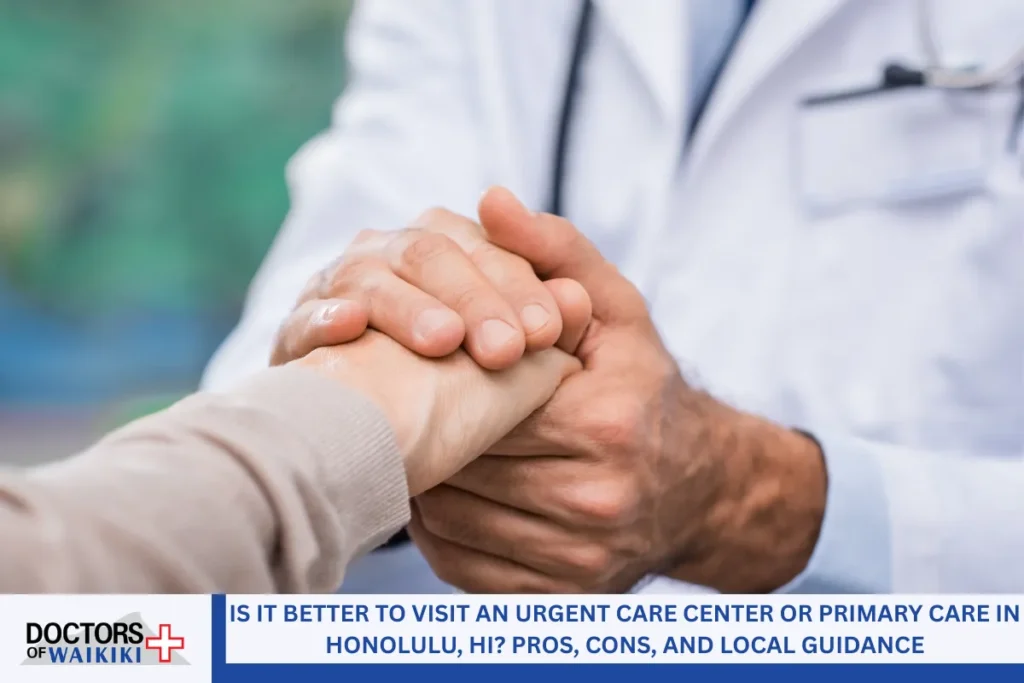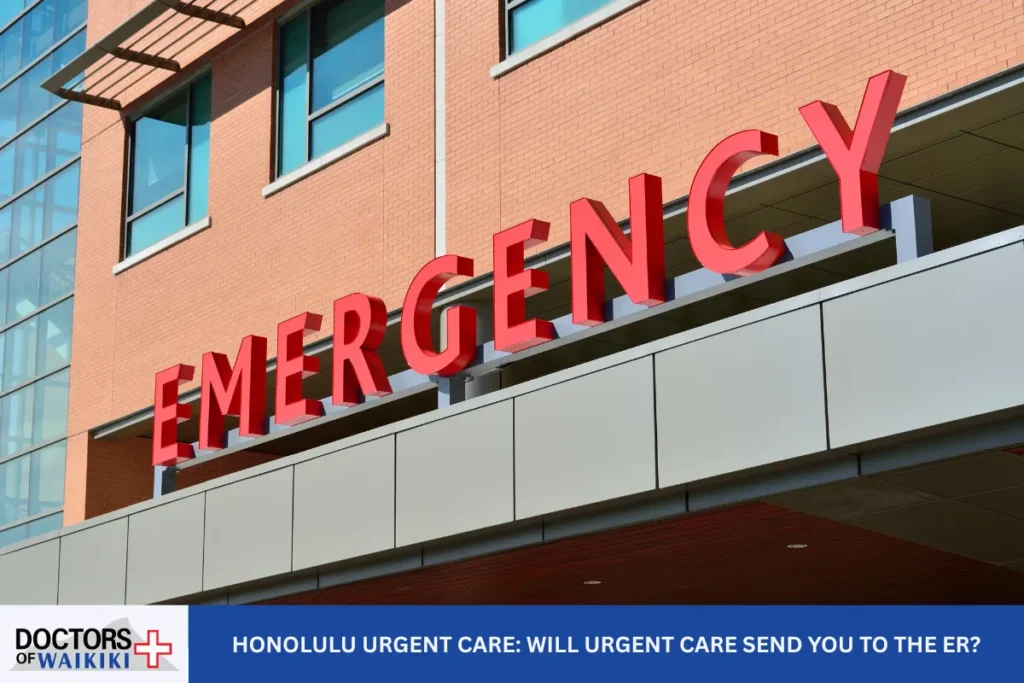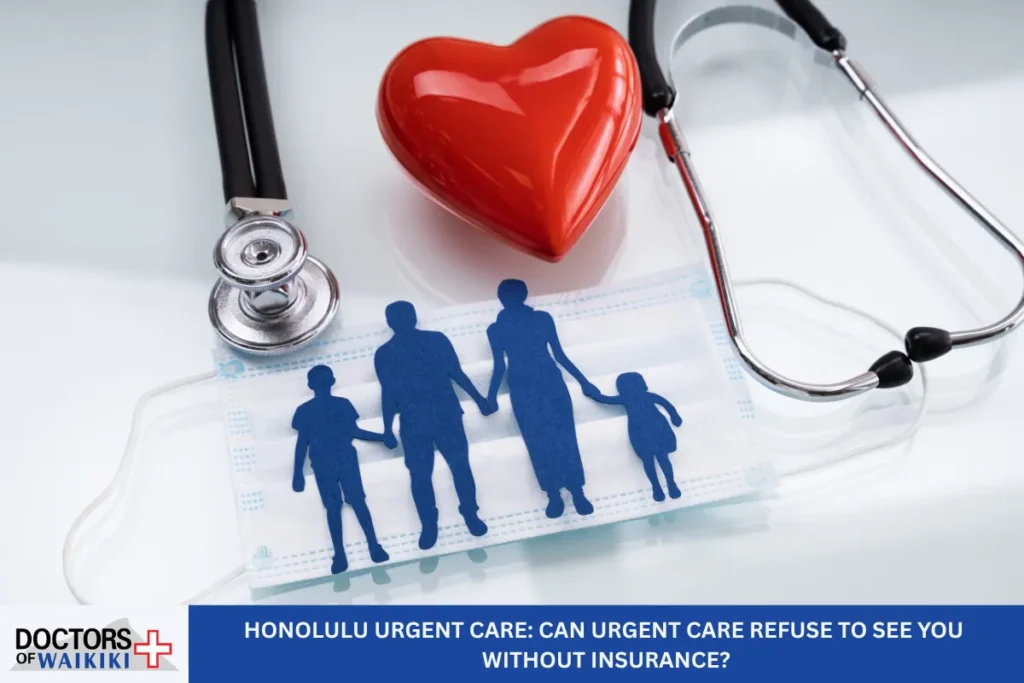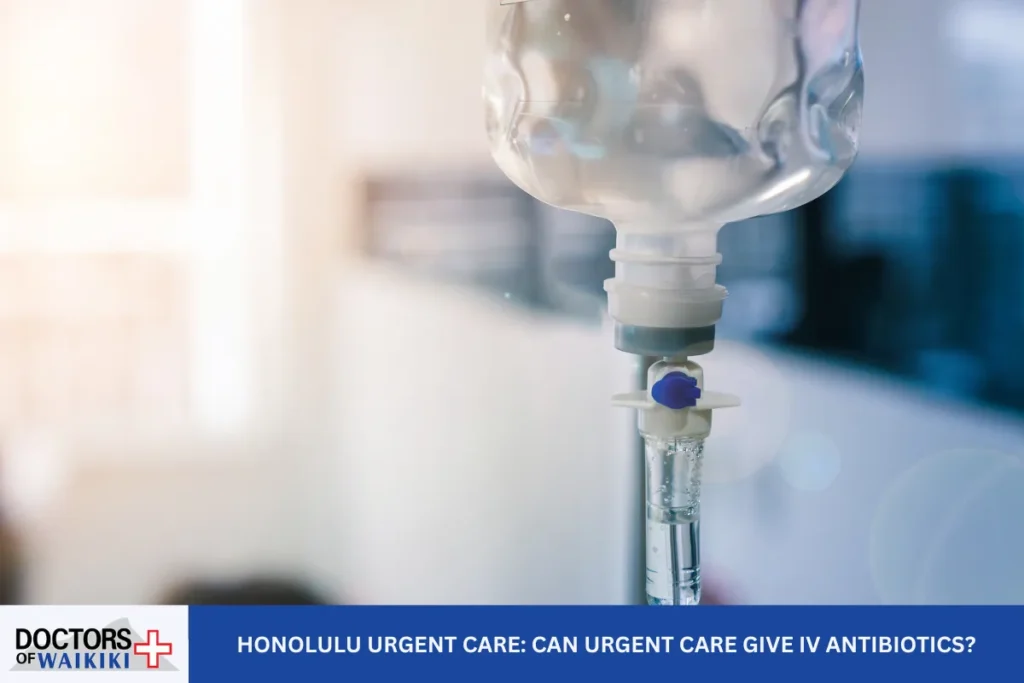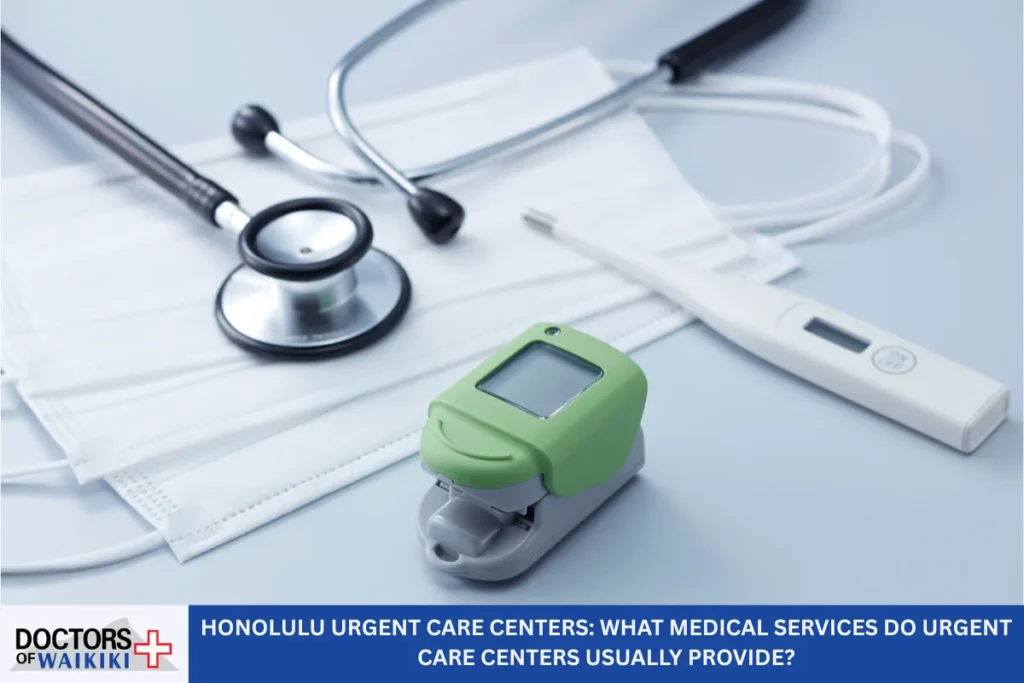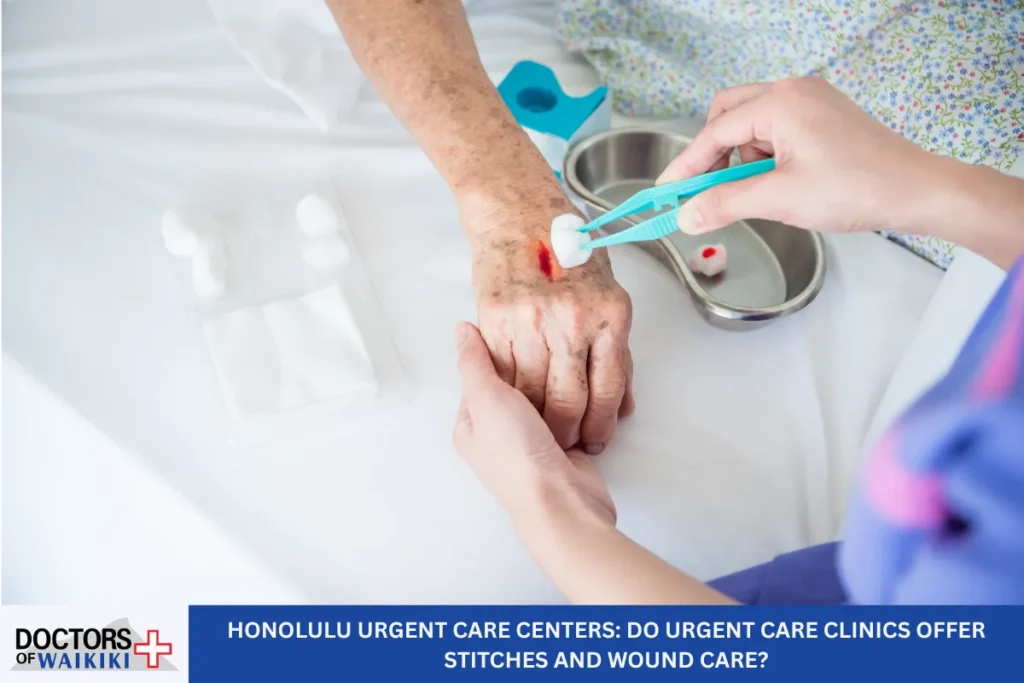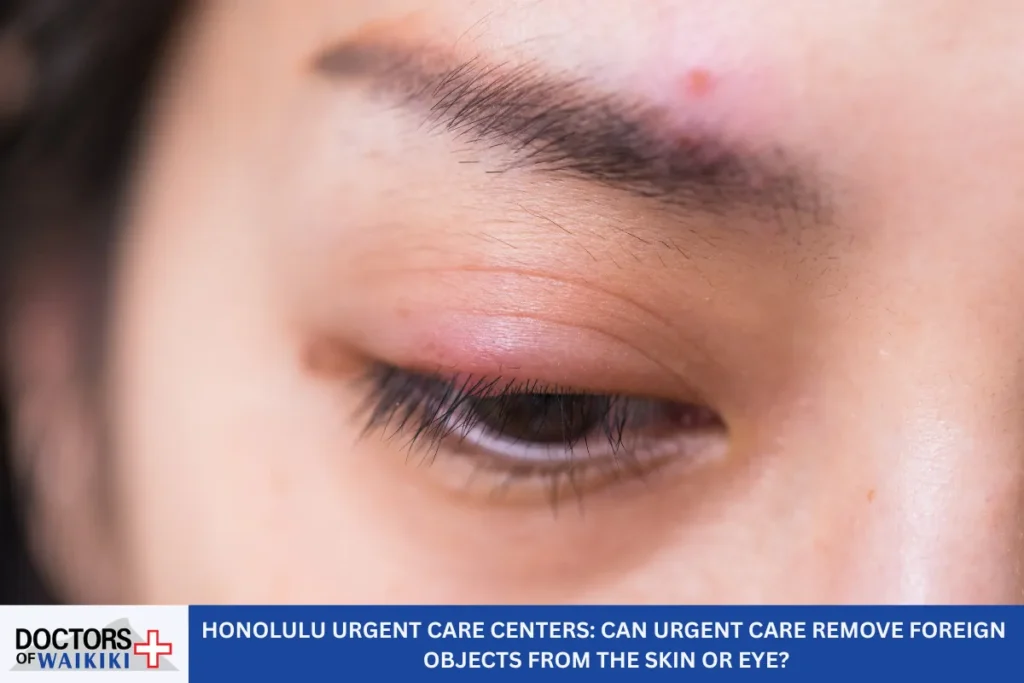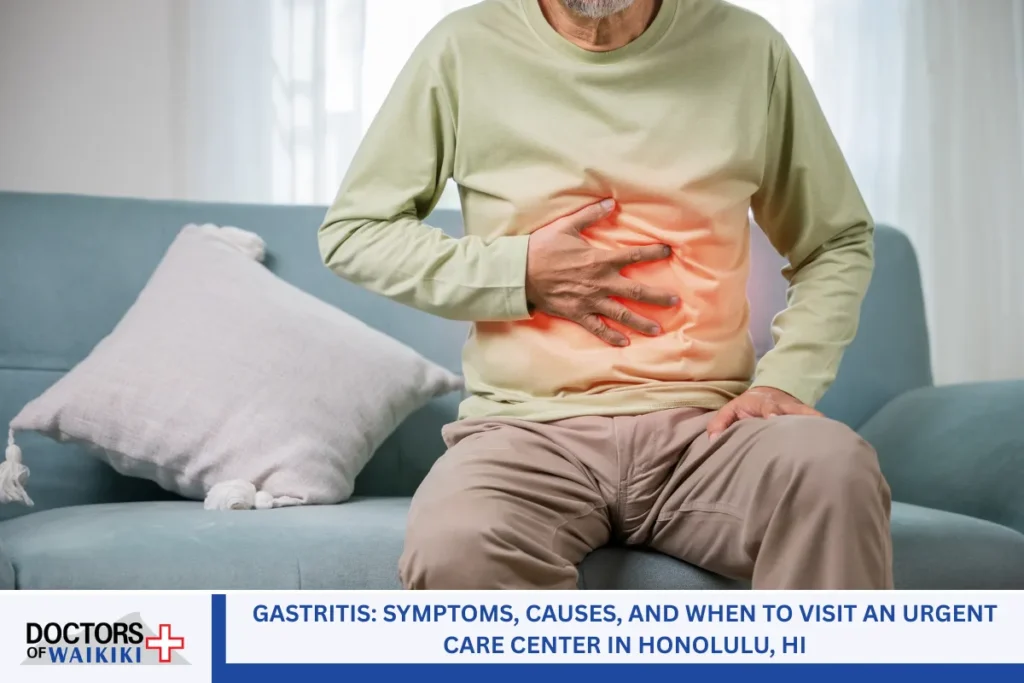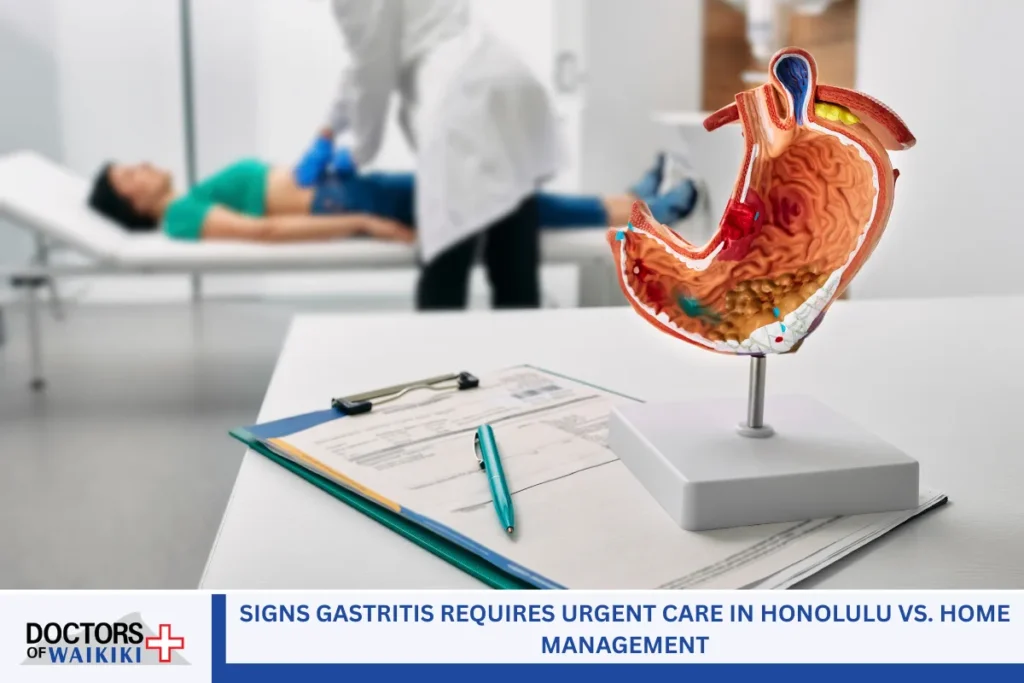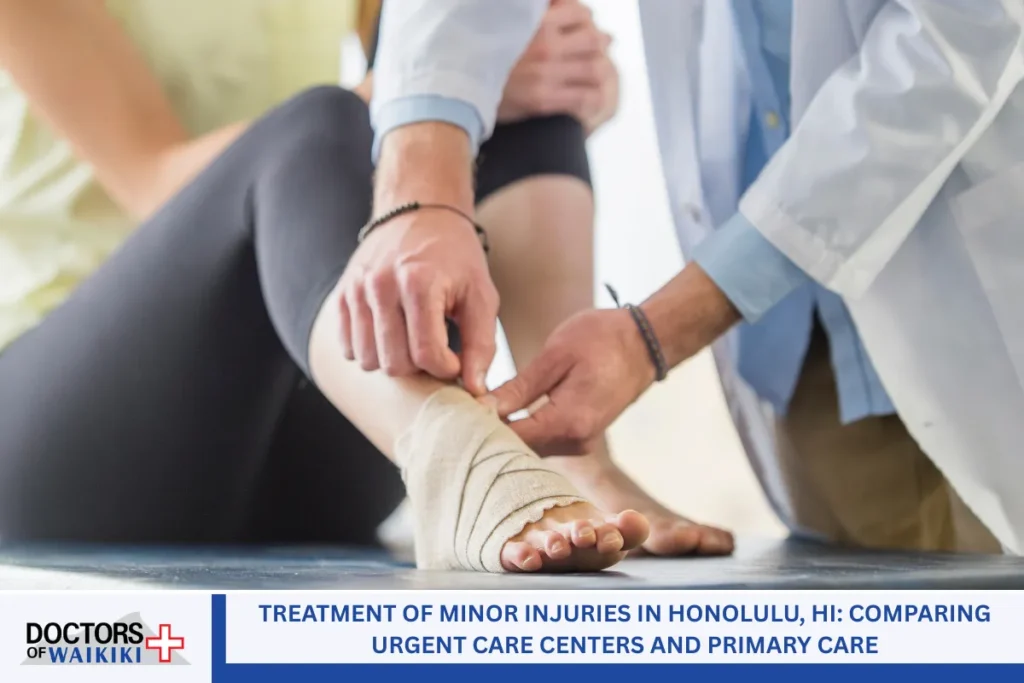Navigating Healthcare Decisions in Honolulu: Urgent Care Center or Primary Care?
When facing sudden illness or injury in Honolulu, HI, choosing between an urgent care center or a primary care provider is a common challenge. Many families wonder which option offers faster relief, better convenience, and the most cost-effective medical care. If you have a runny nose, need covid testing, or experience nonemergency conditions like minor sprains or allergy symptoms and treatments, knowing where to go can make a difference in your health outcome and your wallet. Delaying the right medical consultation can worsen symptoms, increase anxiety, and potentially drive you to the emergency room when it’s not needed. Fortunately, understanding your choices for urgent care services and walk-in clinic appointments in Honolulu helps you make the best decision for yourself and your family, ensuring prompt, quality health care without unnecessary hassle.
Decoding Your Healthcare Options: What’s the Difference?
What is an Urgent Care Center?
An urgent care clinic is a medical facility designed to treat minor to moderate medical issues that require prompt attention but aren’t life-threatening. Walk-in clinics offer flexible hours of operation, allowing you to get care outside regular primary care provider schedules. Whether you need digital x-ray, laboratory testing, immunizations, or treatments for allergies, the medical professionals at urgent care centers provide a wide range of urgent care services. Unlike the emergency room, an urgent care clinic handles nonemergency conditions, helping you avoid high costs and long wait times.
What is Primary Care?
Primary care involves ongoing health management, preventive wellness services, and treatment for chronic conditions. Your primary care provider serves as the foundation for your long-term health care, overseeing your medical history information, vaccination records, and routine immunizations. Primary care also includes family medicine, internal medicine, and regular wellness checkups. Many primary care offices require an appointment, but they are essential for chronic condition management, annual exams, and developing a comprehensive treatment plan.
The Role of the Emergency Room
The emergency room is meant for severe, life-threatening situations—heart attacks, severe injuries, major allergic reactions, and uncontrolled symptoms. ER visits are costly and should only be used when truly necessary. Understanding when to choose urgent medical care or a walk-in clinic instead of the ER helps save time and money while still getting quality medical care from trained healthcare providers and staff.
When to Choose Urgent Care in Honolulu, HI

Fast Relief for Common Medical Issues
Urgent care centers are designed for patients who need quick care for unexpected illnesses or injuries. These facilities welcome walk in patients, making it easier to get help without waiting days for an appointment. Some common reasons to visit an urgent care clinic in Honolulu include:
- Allergy symptoms and treatments (runny nose, watery eyes, nasal congestion, seasonal allergies)
- Minor sprains and strains (orthopedics and orthopedic urgent care)
- Cold and flu symptoms
- Mild asthma attacks
- Minor burns or cuts
- Vaccinations and immunizations
- Diagnostic tests, including tb blood test, covid testing, or biometric testing
- Minor infections (ear, throat, or urinary tract)
- Workers comp injury treatment
- Physical exams, including immigration physicals
Advantages of Urgent Care Services
- Convenience: Many urgent care clinics offer extended hours of operation, including evenings and weekends, making it easier to fit care into your schedule.
- No Appointment Needed: Walk in and receive prompt medical care from a nurse practitioner, medical assistants, and other medical professionals.
- Comprehensive Services: From digital x-ray to laboratory work and allergy testing, urgent care clinics offer a variety of diagnostic and treatment options.
- Cost-Effective: Lower out-of-pocket costs compared to the emergency room, especially for nonemergency conditions.
What to Expect at Your Visit
When you arrive at an urgent care clinic, you’ll be greeted by healthcare providers and staff trained in treating a broad spectrum of medical issues. They will collect your medical history information and discuss your symptoms. The medical team may perform diagnostic tests, offer symptom management, and provide a treatment plan. Some urgent care centers also have on-site pharmacy services for quick prescription fills.
When Primary Care is the Better Option
Building a Long-Term Relationship
A primary care provider knows your complete medical history and understands your health goals. They offer personalized medical consultation, chronic disease management, and preventive care like immunizations and wellness services. Scheduling regular appointments with your primary care provider is essential for:
- Managing chronic conditions (diabetes, hypertension, asthma)
- Preventive screenings and wellness checkups
- Referrals to medical specialists
- Long-term treatment plans
- Reviewing growth factors and health progress
Advantages of Primary Care
- Continuity of Care: Your provider tracks all aspects of your health care over time.
- Personalized Attention: Medical providers get to know your unique health needs.
- Chronic Condition Management: Ongoing support for complex or long-term medical issues.
- Preventive Services: Regular checkups, immunizations, and wellness guidance.
When Primary Care Might Not Be Best
If you need urgent medical care for a sudden injury, illness, or when your primary care provider is unavailable, urgent care services may be a better choice. Walk-in clinics fill this gap by offering care outside regular hours and without the need to schedule in advance.
Comparing Costs and Insurance Coverage for Honolulu Residents
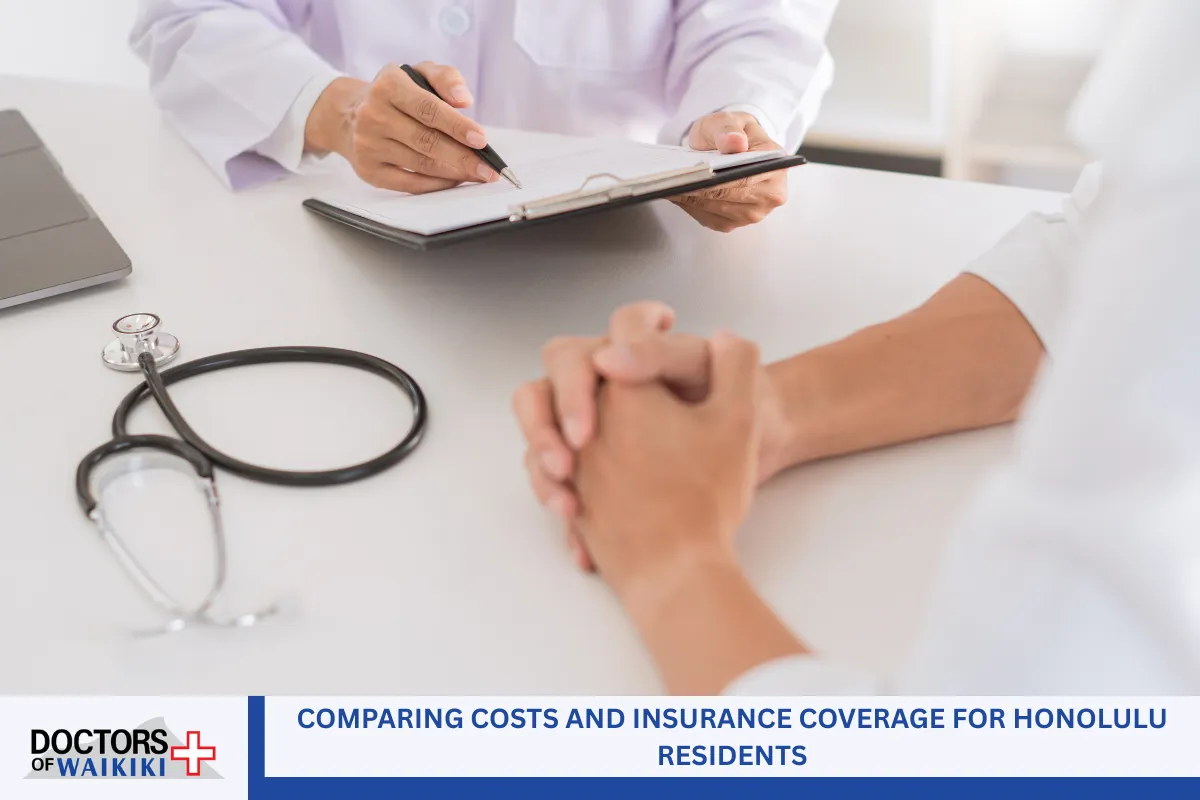
Breaking Down the Costs
Understanding the financial side of your healthcare options is essential. Both urgent care clinics and primary care offices in Honolulu accept a wide range of insurance plans, but there are key differences in costs and billing.
- Urgent Care Center: Typically, copays are lower than those for an emergency room but may be slightly higher than primary care. Payment in full may be required if you lack insurance, though most walk-in clinics work with common insurance providers.
- Primary Care: Routine visits are often covered by insurance with a lower copay, but urgent appointments can sometimes be delayed.
- Emergency Room: The most expensive option, often reserved for true emergencies, with much higher out-of-pocket expenses even for insured patients.
What About Uninsured Patients?
If you don’t have insurance, urgent care clinics and walk-in clinics usually post their prices up front for services like allergy testing, digital x-ray, covid testing, and diagnostic tests. Some offer payment plans or sliding-scale fees based on income.
Questions to Ask About Insurance
- Do you accept my insurance?
- What is the copay for a visit?
- Are diagnostic tests and immunizations included?
- What are my options if I need a follow-up appointment or referral?
Always bring your insurance card and any relevant medical history information to your visit. This helps the medical team provide the most accurate treatment plan and billing.
Local Guidance: Where to Find Walk-In Clinics and Urgent Care Services in Honolulu, HI
Popular Locations and Hours of Operation
Honolulu offers a variety of urgent care clinics and walk-in clinics across the city and nearby neighborhoods. Many are open seven days a week, including evenings and weekends, to accommodate your schedule.
Some clinics specialize in particular services such as orthopedic urgent care, physical therapy, workers comp injury treatment, and immigration physicals. Others are family-focused, providing care for both adults and children. Most facilities provide a convenient address location with ample parking and accessible entry for patients.
Services Commonly Available
- Covid testing, allergy testing, and biometric testing
- Immunizations and vaccination records
- Diagnostic tests (digital x-ray, laboratory services)
- Symptom management for allergies, hay fever, and respiratory issues
- Platelet-rich plasma and growth factors for injury recovery
- Pharmacy services and medication management
- TB blood test, gonorrhea, and syphilis testing
Each urgent care center and walk-in clinic will have slightly different hours of operation, so it’s always a good idea to call ahead or check their website before you walk in.
What to Bring for a Smooth Medical Visit
Be Prepared for Faster Care
Whether you visit an urgent care clinic or your primary care provider, being prepared can speed up your visit and ensure you receive the right medical care.
Bring the following items:
- Insurance card (if you have insurance)
- Valid photo ID
- List of current medications and allergies
- Immunization and vaccination records
- Medical history information (past surgeries, chronic conditions)
- Recent diagnostic test results if available
- Payment in full or copay (if uninsured or if insurance does not cover all services)
Providing accurate information allows the nurse practitioner, medical assistants, and other medical professionals to tailor your treatment plan and ensure safe, effective care.
Deciding Where to Go: Urgent Care or Primary Care for Your Family?

Key Questions to Ask Yourself
Choosing the right healthcare setting depends on your symptoms, the urgency of your medical issues, and the availability of your regular primary care provider.
Ask yourself:
- Are my symptoms severe or life-threatening? (If yes, go to the emergency room.)
- Is this a sudden illness or injury that can’t wait for a primary care appointment?
- Do I need services only available at an urgent care center (digital x-ray, laboratory, covid testing, etc.)?
- Am I managing a chronic condition that needs a provider who knows my medical history?
- Do I need quick allergy relief or treatment for seasonal allergies, hay fever, or other minor medical issues?
Pros and Cons Recap
Urgent Care Center & Walk-In Clinic
- Pros: Immediate care, flexible hours, no appointment needed, wide range of urgent care services, walk-in convenience, and affordable for most nonemergency conditions.
- Cons: Less personalized for ongoing chronic issues, may require follow-up with your primary care provider.
Primary Care Provider
- Pros: Ongoing relationship, holistic care, preventive wellness services, and deeper knowledge of your health.
- Cons: May require waiting for an appointment, limited after-hours availability, urgent concerns may require a referral or outside testing.
Honolulu’s Walk-In Clinics: Special Services You Should Know About
Beyond Standard Care
Many Honolulu urgent care clinics have expanded their services to address a broad range of medical needs:
- Orthopedic Urgent Care: Treatment for minor fractures, joint pain, and soft-tissue injuries.
- Allergy Testing and Symptom Management: On-site testing and immediate allergy relief for symptoms like runny nose, watery eyes, and nasal congestion triggered by seasonal allergies or other allergens.
- Occupational Health: Screening and treatment for work-related injuries, workers comp injury treatment, biometric testing, and return-to-work clearance.
- Wellness Services and Preventive Care: Physical exams, immunizations, digital x-ray, laboratory work, and even platelet-rich plasma treatments for healing and recovery.
- Travel and Immigration Physicals: Complete medical consultation and testing for immigration or travel requirements, including tb blood test, vaccination records, and communicable disease screening.
Medical Professionals and Team-Based Care
Walk-in clinics are staffed by experienced medical professionals, including nurse practitioners, medical assistants, and board-certified physicians. Their collaborative approach ensures that each patient receives thorough, evidence-based medical care. You’re also supported by knowledgeable healthcare providers and staff who handle everything from insurance paperwork to symptom management and follow-up instructions.
Practical Steps: How to Choose the Right Medical Option for You in Honolulu
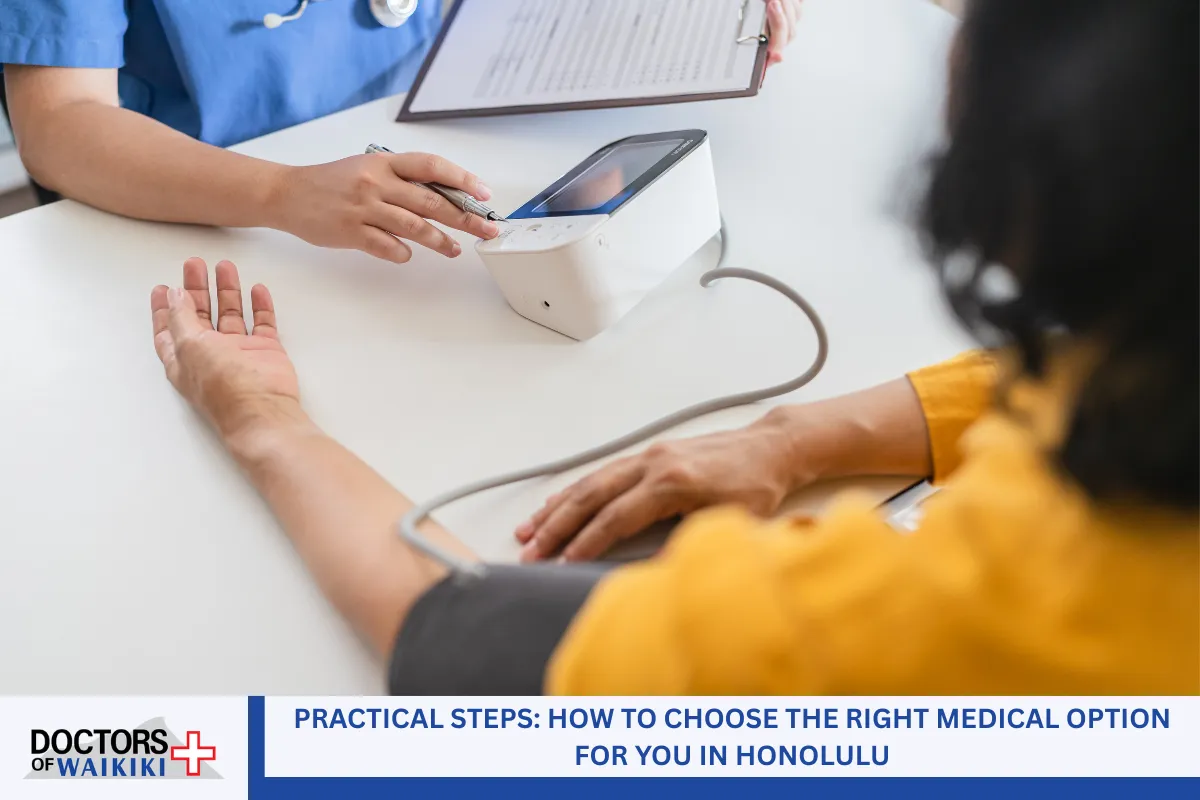
Tips for Making a Confident, Informed Decision
When illness or injury strikes, it’s important to quickly assess your needs so you can choose the right health care setting. Here are a few practical steps to help you decide:
- Evaluate Your Symptoms:
- Life-threatening? Severe bleeding, chest pain, or difficulty breathing means you should go to the emergency room.
- Mild to moderate? Sudden onset of runny nose, cough, minor injury, or allergic reaction? An urgent care center or walk-in clinic is likely your best choice.
- Chronic or preventive? If you need help with diabetes, high blood pressure, medication refills, or annual wellness services, contact your primary care provider.
- Consider Timing and Convenience:
- Need help right away after hours or on weekends? Most urgent care clinics and walk-in clinics in Honolulu are open late and don’t require an appointment.
- If you can wait and want ongoing management or follow-up, primary care may be preferable.
- Check Your Insurance:
- Confirm that the clinic or provider accepts your insurance plan.
- Ask about copays, what’s covered, and if payment in full is required for certain services like allergy testing, digital x-ray, or laboratory work.
- Bring Key Information:
- Save time by bringing your ID, insurance card, vaccination records, list of medications, and any medical history information.
- Make a note of your symptoms, when they started, and any over-the-counter treatments you’ve tried.
- Communicate Clearly:
- Share all symptoms with the medical professionals during your visit. If you’ve had allergy symptoms and treatments before, mention what’s worked and what hasn’t.
Common Mistakes to Avoid
- Using the Emergency Room for Minor Issues: The ER is for true emergencies. For most nonemergency conditions, urgent care or a walk-in clinic is faster and much more affordable.
- Ignoring Symptoms: Don’t wait until your symptoms become severe. Early treatment—especially for allergies, infections, or minor injuries—leads to better outcomes.
- Overlooking Follow-Up Care: If your urgent care provider recommends follow-up with your primary care, make sure to schedule that appointment for ongoing care and management.
Honolulu Healthcare Choices: Making the Best Decision for Your Family
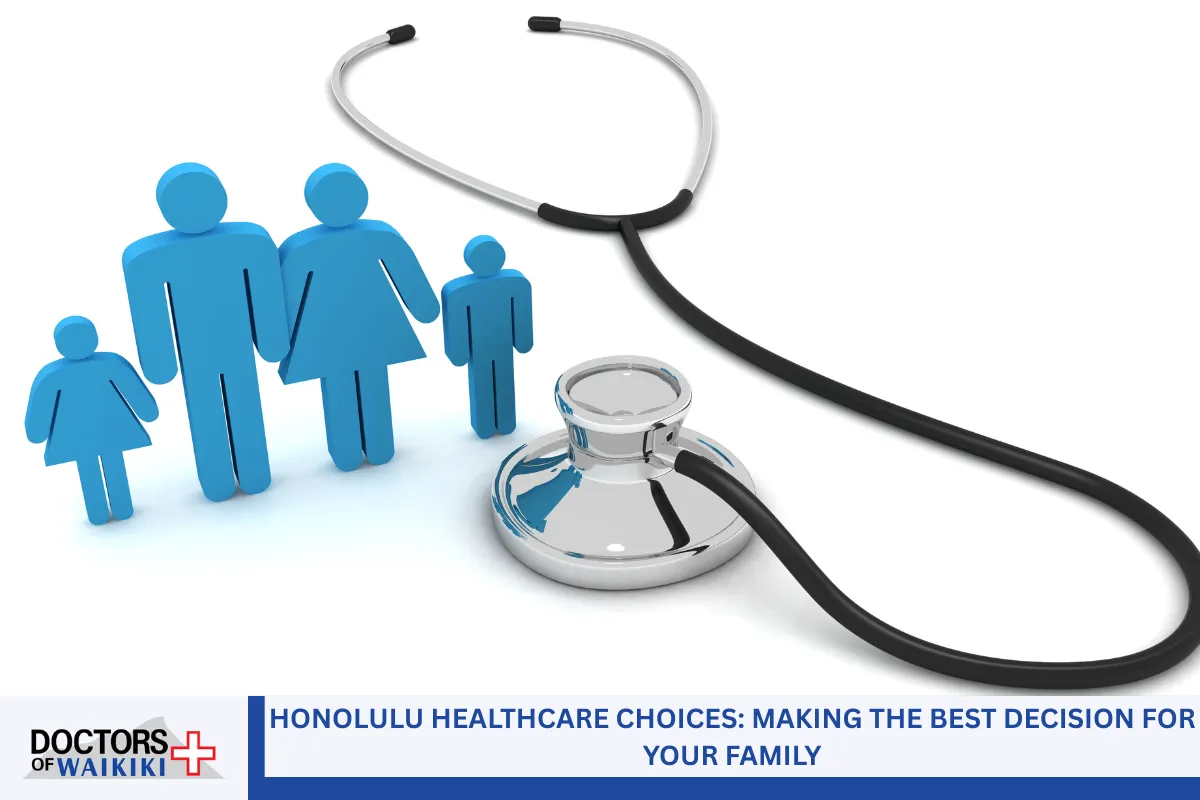
Choosing between an urgent care center, walk-in clinic, or primary care provider can feel overwhelming, especially when you or a loved one isn’t feeling well. In Honolulu, HI, you have access to a wide network of medical professionals and healthcare providers and staff ready to help—whether you walk in for sudden allergy relief or schedule a wellness visit with your family’s primary care provider.
Urgent care clinics offer flexible hours of operation, a broad range of urgent care services, and the ability to walk in without an appointment. They are an excellent choice for nonemergency conditions, including minor injuries, allergy testing, covid testing, diagnostic tests, and quick symptom management. Their experienced medical team—including nurse practitioners and medical assistants—can address everything from orthopedic urgent care to occupational health, immigration physicals, and laboratory work.
Primary care providers deliver ongoing, preventive health care, long-term treatment plans, and personalized attention. For chronic issues, wellness services, and preventive immunizations, building a relationship with a trusted provider is essential.
For Honolulu residents, the decision comes down to the urgency of your symptoms, your need for specialized services, and the convenience of location and hours. No matter which option you choose, be proactive—bring your insurance information, vaccination records, and be ready to discuss your symptoms with the healthcare team.
Your health and peace of mind matter. Take advantage of Honolulu’s wide range of healthcare options and choose the path that best fits your needs. Whether you need urgent medical care, want to walk in for quick relief, or prefer to schedule an appointment with your primary care provider, you can trust the city’s experienced medical professionals to support you and your family every step of the way.
Ready to take control of your health? Honolulu’s urgent care centers, walk-in clinics, and primary care offices are here to help—so you can get back to living your best life, faster.
Urgent Care Center in Honolulu, Hawaii — Doctors of Waikiki
Doctors of Waikiki is Honolulu’s trusted urgent care center for families, travelers, and locals seeking immediate care for minor injuries, sore throats, and sudden illness. Located in the heart of Honolulu, our walk-in care team includes board-certified doctors, emergency medicine physicians, advanced practice providers, and experienced medical facility staff who deliver prompt, high-quality treatment—even in inclement weather. We provide a wide range of urgent care options, from COVID-19 testing, lab tests, and setting and casting broken bones to advanced diagnostic equipment for precise care. Call us today at (808) 922-2112 or fill out our quick contact form to find a physician and get the best urgent care in Honolulu. Your medical records and lab and test results are secure and handled with care, following federal and state privacy regulations.
Frequently Asked Questions
1. When should I choose an urgent care center over the emergency department?
Urgent care centers are ideal for non-life-threatening health issues that still require immediate care, such as sore throats, minor injuries, cold symptoms, or lab tests. You should go to the emergency department for severe chest pain, shortness of breath, heavy bleeding, or any symptoms that may be life-threatening. At Doctors of Waikiki, our urgent ambulatory care team is trained to recognize when a patient needs a higher level of care and will refer you to the emergency department if necessary. By choosing urgent care, you avoid long ER waits and higher costs for nonemergency issues, and can access advanced diagnostic equipment, experienced board-certified doctors, and efficient patient care records management. This ensures you receive prompt, high-quality care while protecting your health information according to federal and state privacy regulations.
2. What services does Doctors of Waikiki provide that primary care or minor injury units may not offer?
Doctors of Waikiki’s urgent care center offers services you might not find at a typical primary care office or minor injury units. Our medical facility provides immediate walk-in care for a wide range of concerns—from COVID-19 testing, sore throats, and seasonal allergies to setting and casting broken bones, orthopedic care, lab and test results, and on-site diagnostic equipment. Our advanced-practice providers and emergency medicine physicians use up-to-date medical technology to treat non-life-threatening conditions efficiently. We also coordinate with your legal representative if necessary and ensure your patient care records are available to you, your primary care provider, or a specialty urgent care provider as needed. Our urgent care options include rapid treatment and the best customer service in Honolulu.
3. How does Doctors of Waikiki handle patient medical records and privacy?
Doctors of Waikiki is committed to maintaining the highest standards of privacy for your medical records. All patient care records are stored and transmitted according to strict federal and state privacy regulations, ensuring confidentiality and security. Whether you need lab tests, COVID-19 testing, or a legal representative to access your records, our team ensures your information is handled with care. Advanced diagnostic equipment and electronic medical records make it easy for our advanced-practice providers and board-certified doctors to review your medical history, lab and test results, and develop personalized treatment plans quickly. We always safeguard your health information and provide copies of relevant records when you transfer care or require additional support.
4. What should I bring when I visit Doctors of Waikiki urgent care center?
For the best urgent care experience at Doctors of Waikiki, please bring your photo ID, insurance information (if you have it), a list of your current medications, details about any allergies, and a summary of your medical records if available. If you have a legal representative, let our customer service team know upon check-in. Bringing recent lab and test results, vaccination records, or diagnostic images helps our advanced practice providers quickly assess your needs. We encourage all patients to be as detailed as possible about their symptoms, such as sore throats or minor injuries, so our board-certified doctors can deliver immediate care and an effective treatment plan tailored to your needs.
5. How do I access urgent care options during inclement weather or after hours?
Doctors of Waikiki remains open for walk-in care, urgent ambulatory care, and advanced urgent care options—even during inclement weather or after regular business hours. Our board-certified doctors and emergency medicine physicians are ready to provide immediate care, including COVID-19 testing, setting and casting broken bones, and minor injury units support. Simply call (808) 922-2112 to find a physician or advanced-practice provider, or walk in for best urgent care in Honolulu. If you need test results or access to patient care records, our team will help, ensuring your information is managed securely and in compliance with privacy laws. For life-threatening emergencies, always visit the emergency department.
Read Questions to Ask Your Pain Management Doctor in Honolulu, HI
Gastritis: Symptoms, Causes, and When to Visit an Urgent Care Center in Honolulu, HI

